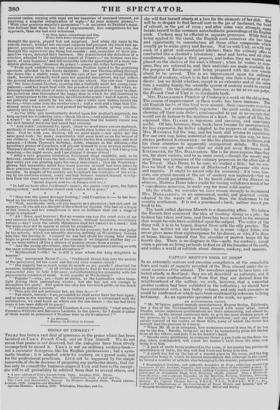BOOKS OF COOKERY.*
THERE has been a vast deal of ignorance in the praise which has been lavished on UDE.S French Cook, and on UDE himself. We do not mean that praise is not deserved, but the eulogists have been utterly incompetent to award it. UDE'S is not an ordinary cookery-book- not a cuisine[ bourgeois, like his English predecessors ; but a syste- matic treatise : it is adapted solely for cookery on a grand scale, and for the professional practician. Let it not be supposed by the simple housewife, if she be desirous of preparing any particular dainty, that she has only to consult the luminous pages of UDE and turn to the receipt : she will in all probability be referred from that to several others, and * A net: edition of Ude's French Cook. 12mo. London, 1829. Ebers. Practice of Cookery. By Mrs. Dalgairns. Edinburgh, le29. Catkin and Co. The Cook and Housewife's Manual. By Mistress Margaret Dods. Fourth edition. London, 1529. Simphin and Marshall.
Apician Morsels. London, 1829. Whittaker, Treacher, and Co. she will find herself utterly at a loss for the elements of her dish. She will be in despair to find herself sent to the jar of bechamel, the bowl
of veloute, or the pot of roux; and after some vain attempts, again
betake herself to the common autochediastic proceedings of the English cook. Cookery may be effected in separate processes. While heat is
being applied to the viand, the English cook conceives she has time
and opportunity to manufacture all those other compounds which usually go to make gravy and flavour. Not'so with UDE, or with any
cook of a great well-conducted kitchen: there the culinary office is conducted like a chemist's laboratory ; meat and herbs, and all other condiments, undergo a first process, and before they are wanted are placed on the shelves of the cook's library ; when he wishes to com- pose, they are referred to, and their materials are made available for the purpose of flavouring and being prepared with the raw viands about to be served. This is an improvement upon the ordinary method of cookery, which is in fact nothing else than a heap of expe- dients : but we doubt whether, except in an extensive and at the same time a wealthy family, the scientific system of cookery could be carried into effect. On the systen.atic plan, however, as far as we can judge, the French Cook of UDE is an invaluable book.
Mrs. DALGAIRNS'S Practice of Cookery is a work on the old system. The course of improvement in these works has been immense. The old English books of this kind were absurd : their successors were less ridiculous, but extravagantly expensive : the good cooks, desirous of showing off their gala dishes, condescended to put in no receipts that would not do honour to the mistress of a feast. In spite of all this, the supposed Mrs. GLASSE is ingenious and amusing, and sometimes useful. Of late, however, these books have become far more practical, far less expensive, far better adapted to the purposes of ordinary life. Mrs. RUNDELL led the way, and her book still retains its reputation. For our own use, being somewhat of an amateur in this way, we have always preferred KITCHENER: we like his plainness, his liveliness, and his close attention to apparently unimportant details. We think, however—we are not sure—that we shall put away RUNDELL and KITCHENER, for Mrs. DALGAIRNS. She is far more copious than they are, far more various, and to us more novel, —though the novelty may arise from our ignorance of the culinary processes on the other side of the Tweed. MEG DODS, to be sure, we studied a little ; but we con- fess we liked not the mixture of Blackwood's Magazine with stews and ragouts. It might be meant only for seasoning : if it were, how- ever, one grand maxim of the art of cookery was neglected—that no flavour should predominate. In the fourth edition of the Manual, we observe, Mistress DODS takes credit for having withdrawn much of her " superfluous nonsense, to make way for more solid matter." On the whole, we consider we have reason strongly to recommend Mrs. DALGAIRNS.S, as an economical, useful, and practical system, adapted to the wants of all families, from the tradesman to the country gentleman. It is not a gourmand's book, neither does it pre- tend to be.
The book called Apician Morsels is a disgusting affair. We believe the French first conceived the idea of treating dining as a joke : the fashion has taken root here, and there has been no end to the nonsense that would-he-wits have scribbled upon the subject. The writer of this thing will, it is to be hoped, disgust them with the silly practice. The man has neither wit nor knowledge : he is some vulgar fellow, who never gives more than eighteenpence for his dinner, or who, if he dines at home, blesses himself that the shoulder of mutton keeps till the fourth day. There is no disgrace in this—quite the contrary-, except when a person so living pretends to feed on all the luxuries of the earth, and writes a world of rubbish about dinners, cookery, and manners.


















 Previous page
Previous page